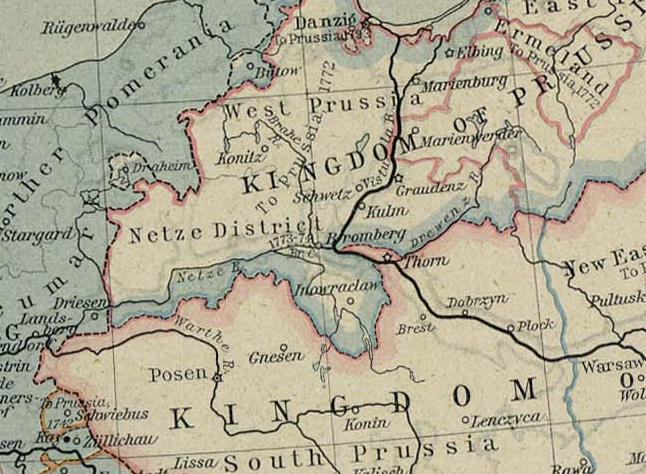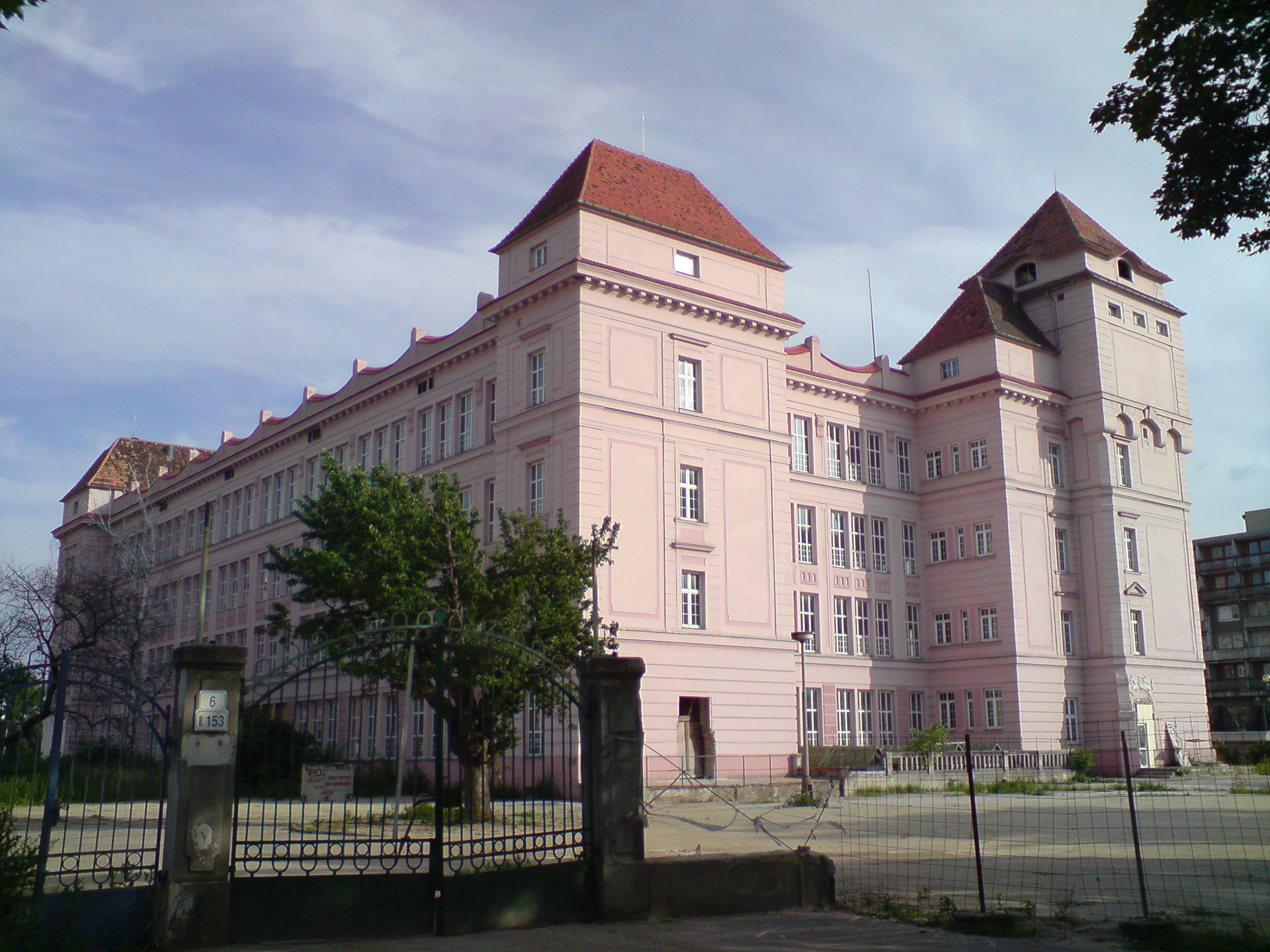|
Biały Bór
Biały Bór (; formerly german: Baldenburg) is a town in Szczecinek County, West Pomeranian Voivodeship, Poland, with 2,226 inhabitants as of December 2021. History The settlement was founded in the 13th century. It was part of Poland, until the Teutonic invasion in the early 14th century. Located at a formerly important crossroad, the Teutonic Knights built a fortification here, and in 1382 the settlement received Kulm law town rights. The town's development was stopped by a large fire in 1408. No traces remain of the castle, but remnants of the medieval city wall have been incorporated in some later houses. During the Thirteen Years' War it was recaptured by the Poles in 1461, and it was confirmed as part of Poland in 1466. Since then it was part of the Pomeranian Voivodeship until the First Partition of Poland in 1772, when it was annexed by Prussia, and subsequently from 1871 it was part of Germany. Up until the 20th century, the town economy consisted mostly of fishing, ... [...More Info...] [...Related Items...] OR: [Wikipedia] [Google] [Baidu] |
Voivodeships Of Poland
A voivodeship (; pl, województwo ; plural: ) is the highest-level administrative division of Poland, corresponding to a province in many other countries. The term has been in use since the 14th century and is commonly translated into English as "province". The Polish local government reforms adopted in 1998, which went into effect on 1 January 1999, created sixteen new voivodeships. These replaced the 49 former voivodeships that had existed from 1 July 1975, and bear a greater resemblance (in territory, but not in name) to the voivodeships that existed between 1950 and 1975. Today's voivodeships are mostly named after historical and geographical regions, while those prior to 1998 generally took their names from the cities on which they were centered. The new units range in area from under (Opole Voivodeship) to over (Masovian Voivodeship), and in population from nearly one million (Opole Voivodeship) to over five million (Masovian Voivodeship). Administrative authority at th ... [...More Info...] [...Related Items...] OR: [Wikipedia] [Google] [Baidu] |
Kulm Law
Kulm law, Culm law or Chełmno Law (german: Kulmer Recht; lat, Jus Culmense vetus; pl, Prawo chełmińskie) was a legal constitution for a municipal form of government used in several Central European cities during the Middle Ages. It was initiated on 28 December 1233 in the Monastic State of the Teutonic Knights by Hochmeister Hermann von Salza and Hermann Balk when the towns of Thorn (Toruń) and Chełmno (Kulm) received German town law, in particular as a modification of Magdeburg rights. Named after the town it was signed in, the original document (''Kulmer Handfeste'') was lost in 1244 when the town hall burned due to an attack by Swantopolk II, Duke of Pomerania. The renewed charter of 1 October 1251 was based on a copy in Thorn, but the rights were reduced. This type of law was mostly granted by the Teutonic Order to cities within their monastic state, but also adopted by cities elsewhere, mainly in the neighboring independent Duchy of Masovia. In addition, the Kulm law ... [...More Info...] [...Related Items...] OR: [Wikipedia] [Google] [Baidu] |
Holocaust
The Holocaust, also known as the Shoah, was the genocide of European Jews during World War II. Between 1941 and 1945, Nazi Germany and its collaborators systematically murdered some six million Jews across German-occupied Europe; around two-thirds of Europe's Jewish population. The murders were carried out in pogroms and mass shootings; by a policy of extermination through labor in concentration camps; and in gas chambers and gas vans in German extermination camps, chiefly Auschwitz-Birkenau, Bełżec, Chełmno, Majdanek, Sobibór, and Treblinka in occupied Poland. Germany implemented the persecution in stages. Following Adolf Hitler's appointment as chancellor on 30 January 1933, the regime built a network of concentration camps in Germany for political opponents and those deemed "undesirable", starting with Dachau on 22 March 1933. After the passing of the Enabling Act on 24 March, which gave Hitler dictatorial plenary powers, the government began isolating Je ... [...More Info...] [...Related Items...] OR: [Wikipedia] [Google] [Baidu] |
World War II
World War II or the Second World War, often abbreviated as WWII or WW2, was a world war that lasted from 1939 to 1945. It involved the vast majority of the world's countries—including all of the great powers—forming two opposing military alliances: the Allies and the Axis powers. World War II was a total war that directly involved more than 100 million personnel from more than 30 countries. The major participants in the war threw their entire economic, industrial, and scientific capabilities behind the war effort, blurring the distinction between civilian and military resources. Aircraft played a major role in the conflict, enabling the strategic bombing of population centres and deploying the only two nuclear weapons ever used in war. World War II was by far the deadliest conflict in human history; it resulted in 70 to 85 million fatalities, mostly among civilians. Tens of millions died due to genocides (including the Holocaust), starvation, ma ... [...More Info...] [...Related Items...] OR: [Wikipedia] [Google] [Baidu] |
Posen-West Prussia
The Frontier March of Posen-West Prussia (german: Grenzmark Posen-Westpreußen, pl, Marchia Graniczna Poznańsko-Zachodniopruska) was a province of Prussia from 1922 to 1938. Posen-West Prussia was established in 1922 as a province of the Free State of Prussia within Weimar Germany, formed from merging three remaining non-contiguous territories of Posen and West Prussia, which had lost the majority of their territory to the Second Polish Republic and Free City of Danzig in the Treaty of Versailles. From 1934, Posen-West Prussia was ''de facto'' ruled by Brandenburg until it was dissolved by Nazi Germany, effective 1 October 1938 and its territory divided between the Prussian provinces of Pomerania, Brandenburg and Silesia. Schneidemühl (present-day Piła) was the provincial capital. Today, the province is entirely contained within the modern state of Poland. Background Until the late 18th century partitions of Poland, the lands which made up Posen-West Prussia had been ... [...More Info...] [...Related Items...] OR: [Wikipedia] [Google] [Baidu] |
Gdańsk Pomerania
Gdańsk Pomerania ( pl, Pomorze Gdańskie), csb, Gduńsczim Pòmòrzã, german: Danziger Pommern) is a geographical region within Pomerelia in northern and northwestern Poland, covering the bulk of Pomeranian Voivodeship. It forms a part and the bulk of Pomerelia, also known as Vistula Pomerania, Eastern Pomerania, and previously Polish Pomerania; however, in contrast to the latter terms, it does not cover the historical areas of Chełmno Land and Michałów Land, sometimes with the addition of Lubawa Land. It has traditionally been divided into Kashubia, Kociewie and Tuchola Forest regions. The Lauenburg and Bütow Land is considered by the Polish historiography a part of Kashubia (and thus Gdansk Pomerania), while German historiography tends to treat it as a part of Farther Pomerania. Gdansk Pomerania has been inhabited by ethnic Kashubians, Kociewians and Borowians, respectively. Name In Polish language, the area was called ('Pomerania') since the Middle Ages. In the ear ... [...More Info...] [...Related Items...] OR: [Wikipedia] [Google] [Baidu] |
Textile Industry
The textile industry is primarily concerned with the design, production and distribution of yarn, cloth and clothing. The raw material may be natural, or synthetic using products of the chemical industry. Industry process Cotton manufacturing Cotton is the world's most important natural fibre. In the year 2007, the global yield was 25 million tons from 35 million hectares cultivated in more than 50 countries. There are five stages of cotton manufacturing: * Cultivating and Harvesting * Preparatory Processes * Spinning — giving yarn * Weaving — giving fabrics * Finishing — giving textiles Synthetic fibres Artificial fibres can be made by extruding a polymer, through a spinneret (polymers) into a medium where it hardens. Wet spinning (rayon) uses a coagulating medium. In dry spinning (acetate and triacetate), the polymer is contained in a solvent that evaporates in the heated exit chamber. In melt spinning (nylons and polyesters) the extruded polymer is cooled in gas or ... [...More Info...] [...Related Items...] OR: [Wikipedia] [Google] [Baidu] |
German Empire
The German Empire (),Herbert Tuttle wrote in September 1881 that the term "Reich" does not literally connote an empire as has been commonly assumed by English-speaking people. The term literally denotes an empire – particularly a hereditary empire led by an emperor, although has been used in German to denote the Roman Empire because it had a weak hereditary tradition. In the case of the German Empire, the official name was , which is properly translated as "German Empire" because the official position of head of state in the constitution of the German Empire was officially a "presidency" of a confederation of German states led by the King of Prussia who would assume "the title of German Emperor" as referring to the German people, but was not emperor of Germany as in an emperor of a state. –The German Empire" ''Harper's New Monthly Magazine''. vol. 63, issue 376, pp. 591–603; here p. 593. also referred to as Imperial Germany, the Second Reich, as well as simply Germany, ... [...More Info...] [...Related Items...] OR: [Wikipedia] [Google] [Baidu] |
Kingdom Of Prussia
The Kingdom of Prussia (german: Königreich Preußen, ) was a German kingdom that constituted the state of Prussia between 1701 and 1918.Marriott, J. A. R., and Charles Grant Robertson. ''The Evolution of Prussia, the Making of an Empire''. Rev. ed. Oxford: Clarendon Press, 1946. It was the driving force behind the unification of Germany in 1871 and was the leading state of the German Empire until its dissolution in 1918. Although it took its name from the region called Prussia, it was based in the Margraviate of Brandenburg. Its capital was Berlin. The kings of Prussia were from the House of Hohenzollern. Brandenburg-Prussia, predecessor of the kingdom, became a military power under Frederick William, Elector of Brandenburg, known as "The Great Elector". As a kingdom, Prussia continued its rise to power, especially during the reign of Frederick II, more commonly known as Frederick the Great, who was the third son of Frederick William I.Horn, D. B. "The Youth of Frederick ... [...More Info...] [...Related Items...] OR: [Wikipedia] [Google] [Baidu] |
Pomeranian Voivodeship (1466–1772)
The Pomeranian Voivodeship ( pl, Województwo pomorskie) was a unit of administrative division and local government in the Kingdom of Poland and the Polish–Lithuanian Commonwealth from 1454/1466 until the First partition of Poland in 1772. From 1613 the capital was at Skarszewy. The name ''Pomerania'' derives from the Slavic ''po more'', meaning "by the sea" or "on the sea". (Pommersches Landesmuseum, German) History The comprised the westernmost part of |
Kingdom Of Poland (1385–1569)
The Crown of the Kingdom of Poland ( pl, Korona Królestwa Polskiego; Latin: ''Corona Regni Poloniae''), known also as the Polish Crown, is the common name for the historic Late Middle Ages territorial possessions of the King of Poland, including the Kingdom of Poland proper. The Polish Crown was at the helm of the Polish–Lithuanian Commonwealth from 1569 to 1795. Major political events The Kingdom of Poland has been traditionally dated back to c. 966, when Mieszko I and his pagan Slavic realm joined Christian Europe (Baptism of Poland), establishing the state of Poland, a process started by his Polan Piast dynasty ancestors. His oldest son and successor, Prince Bolesław I Chrobry, Duke of Poland, became the first crowned King of Poland in 1025. Union of Krewo The Union of Krewo was a set of prenuptial agreements made in the Kreva Castle on August 13, 1385. Once Jogaila confirmed the prenuptial agreements on August 14, 1385, Poland and Lithuania formed a personal uni ... [...More Info...] [...Related Items...] OR: [Wikipedia] [Google] [Baidu] |




